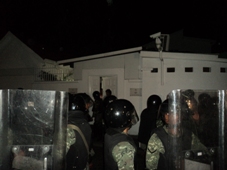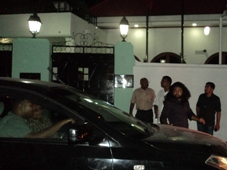The presidential commission has forwarded a case for prosecution against former President Maumoon Abdul Gayoom’s half brother and MP, Abdulla Yameen, for his alleged involvement in the international illegal oil trade worth up to US$800 million whilst he was the chairman of the State Trading Organisation (STO) till 2005.
Yameen has publicly dismissed the allegations on several occasions, distancing himself from the Singapore branch of the STO where the trade to Burma took place, as well as disputing any illegality in the trade.
The allegations first appeared in February 2011 in India’s The Week magazine in a cover story by Sumon Chakrabarti, Chief National Correspondent of CNN-IBN, who described Yameen as “the kingpin” of a scheme to buy subsidised oil through STO’s branch in Singapore and sell it through a joint venture called ‘Mocom Trading’ to the Burmese military junta, at a black market premium price.
The article draws heavily on an investigation report by international accountancy firm Grant Thorton, commissioned by the Maldives government in March 2010, which obtained three hard drives containing financial information detailing transactions from 2002 to 2008. No digital data was available before 2002, and the paper trail “was hazy”.
Investigators learned that Mocom Trading was set up in February 2004 as a joint venture between STO Singapore and a Malaysian company called ‘Mocom Corporation Sdn Bhd’, with the potential lucrative deal of selling oil to Myanmar and an authorised capital of US$1 million – but instead, acted as a front to an international money laundering racket that has cost Maldives millions of dollars.
The report subsequently prompted an investigation into the alleged illegal trade by the Presidential Commission, investigative body appointed by President Mohamed Nasheed and the parliament’s National Security Committee questioned the alleged parties.
Chair of the presidential commission ‘Sarangu’ Adam Manik stated in a press conference on Tuesday that the investigation’s findings implicated Yameen and two other shareholders of STO Singapore – Former Managing Director of STO Mohamed Manik and former Managing Director of STO Singapore Ahmed Muneez.
“The three together were involved in this [illegal oil trade],” claimed Manik. “The oil trade carried out through Mocom Singapore is alleged to have involved fraud, transactions that deliberately caused losses to the company as well as a lot of illegal transactions which were against general business principles.”
Therefore, he said, the commission has requested the police and Prosecutor General’s Office (PGO) this week to file the criminal charges against the three men, and asked the Attorney General’s Office (AGO) to pursue civil compensation suits against the three. Singaporean authorities will also go forward with the prosecution cases, he added.
However, he said the authorities will make the final decision on who will be prosecuted based on the findings.
Manik pointed out that the findings reveal that Mocom did not make any sales between 2004 and 2005, while 2001, 2002 and 2003’s financial statements audit showed that the company made a total profit of only SD 51,930.
However, in 2004 alone, an unnamed shareholder of Mocom received SD 51 million as sales commission, according to Manik.
“Hence, even though the company’s [Mocom’s] sales belong to STO Singapore, it did not receive anything and kept facing losses while certain shareholders and alleged parties kept making undue financial gains,” Manik explained.
He added that while the investigation is still not over they had decided to put the alleged parties on trial as the commission believed there was enough evidence to prosecute them.
However, more evidence of fraud will likely to be exposed during the trial, Manik said.
Operation history
“The Maldives receives subsidised oil from OPEC nations, thanks to its 100 percent Sunni Muslim population. The Gayooms bought oil, saying it was for the Maldives, and sold it to Myanmar on the international black market. As Myanmar is facing international sanctions, the junta secretly sold the Burmese and ‘Maldivian’ oil to certain Asian countries, including a wannabe superpower,” alleged Chakrabarti, who is writing a book on Gayoom’s administration and the democratic movement that led to its fall.
“Sources in the Singapore Police said their investigation has confirmed ‘shipping fraud through the diversion of chartered vessels where oil cargo intended for the Maldives was sold on the black market creating a super profit for many years,’” the report added.
Referencing an unnamed Maldivian cabinet Minister, The Week stated that: “what is becoming clear is that oil tankers regularly left Singapore for the Maldives, but never arrived here.”
According to The Week, Grant Thorton’s report identifies Myanmar businessman and head of the Kanbawza Bank and Kanbawza Football Club, Aung Ko Win, as the middleman acting between the Maldivian connection and Vice-Senior General Maung Aye, the second highest-ranking member of the Burmese junta – one of the world’s most oppressive regimes, perhaps exceeded only by North Korea.
Also allegedly implicated in the Grant Thorton report are Brigader-General Lun Thi, the junta’s Minister of Energy, Aung Thaung, the Burmese Minister of industry, “and his son, Major Pye Aung, who is married to Aye’s daughter, Nander Aye.”
“Another Burmese business couple, Tun Myint Naing (aka ‘Steven Law’) and his wife, were linked to the Gayooms,” alleged The Week.
According to a 2000 report on the Golden Triangle Opium trade by Hong Kong-based regional security analysis firm, Asia Pacific Media Services, “in 1996 Steven Law was refused a visa to the USA on suspicion of involvement in narcotics trafficking”, and several companies linked to him were blacklisted because of his suspected involvement in his father’s drug empire.
His father, Lo Hsing Han, also known as Law Sit Han, is named in the report as a notorious ‘Golden Triangle’ heroin baron turned businessman, with financial ties to Singapore. He was also responsible for arranging a lavish wedding in 2006 for the daughter of Burmese dictator Than Shwe.
“Lo Hsing-han and his family set up the Asia World Company… involved in import-export business, bus transport, housing and hotel construction, a supermarket chain, and Rangoon’s port development,” APMS wrote.
According to The Week’s report, “Yameen was allegedly aided by Muneez, and by Mohamed Manik.”
The operation continued with fuel purchased by STO Singapore from companies including Shell Eastern Petroleum Pvt Ltd, Singapore Petroleum Company and Petronas, and sold mostly to the STO (for Maldivian consumption) and Myanmar, “except in 2002, when the bulk of the revenue came from Malaysia.”
The “first red flag” appeared in an audit report on the STO by KPMG, one of the four major international auditing firms which took over the STO’s audits in 2004 from Price WaterhouseCoopers.
Investigators learned that Mocom Trading was set up in February 2004 as a joint venture and had four shareholders: Kamal Bin Rashid, a Burmese national, Maldivians Fathimath Ashan and Sana Mansoor, and a Malaysian man named Raja Abdul Rashid Bin Raja Badiozaman. Badiozaman was the Chief of Intelligence for the Malaysian armed forces for seven years and a 34 year veteran of the military, prior to his retirement in 1995 at the rank of Lieutenant General.
As well as the four shareholders, former Managing Director of STO Singapore Ahmed Muneez served as director. The Week reported that Muneez informed investigators that Mocom Corportation was one of four companies with a tender to sell oil to the Burmese junta, alongside Daewoo, Petrocom Energy and Hyandai.
Under the contract, wrote The Week, “STO Singapore was to supply Mocom Trading with diesel. But since Mocom Corporation held the original contact, the company was entitled to commission of nearly 40 percent of the profits.”
That commission was to be deposited in a United Overseas Bank account in Singapore, “a US dollar account held solely by Rashid. So, the books would show that the commission was being paid to Mocom, but Rashid would pocket it.”
In a second example cited by The Week, investigators discovered that “STO Singapore and Mocom Trading duplicated sales invoices to Myanmar. The invoices showed the number of barrels delivered and the unit price. Both sets of invoices were identical, except for the price per barrel. The unit price on the STO Singapore invoices was US$5 more than the unit price of the Mocom Trading invoice. This was done to confuse auditors.”
As a result, “the sum total of all Mocom Trading invoices to Myanmar Petrochemical Enterprises was US$45,751,423, while the sum total of the invoices raised by STO Singapore was US$51,423,523 – a difference of US$5,672,100.”
Furthermore, “investigators found instances where bills of lading (indicating receipt of consignment) were unsigned by the ship’s master.
Despite his officially stepping down from the STO in 2005, the Grant Thorton report says that debit notes in Singapore “show payments made on account of Yameen in 2007 and 2008.”
“The debit notes were created as a result of receiving funds from Mr Yameen deposited at the STO head office, which were then transferred to STO Singapore’s bank accounts. This corresponded with a document received from STO head office confirming the payments were deposited by Yameen into STO’s bank accounts via cheque.
“In conversation with Mr Muneez, this was to provide monies for the living expenses of his [Yameen’s] son and daughter, both studying in Singapore. Their living expenses were distributed by Mr Muneez,” the Grant Thorton report stated.
In a previous interview with Minivan News, Yameen confirmed that he had used the STO’s accounts to send money to his children in Singapore, “and I have all the receipts.”
He at the time described the then STO head in Singapore as “a personal friend”, and said “I always paid the STO in advance. It was a legitimate way of avoiding foreign exchange [fees]. The STO was not lending me money.”
He denied sending money following his departure from the organisation: “After I left, I did not do it. In fact I did not do it 3 to 4 years before leaving the STO. I used telegraphic transfer.”
Yameen described the wider allegations contained in The Week article as “absolute rubbish”, and denied being under investigation by the Singaporean police saying that he had friends in Singapore who would have informed him if that were the case.
The article, he said, was part of a smear campaign orchestrated by current President of the Maldives Mohamed Nasheed, a freelance writer and the dismissed Auditor General “now in London”, who he claimed had hired the audit team – “they spent two weeks in the STO in Singapore conducting an investigation.”

